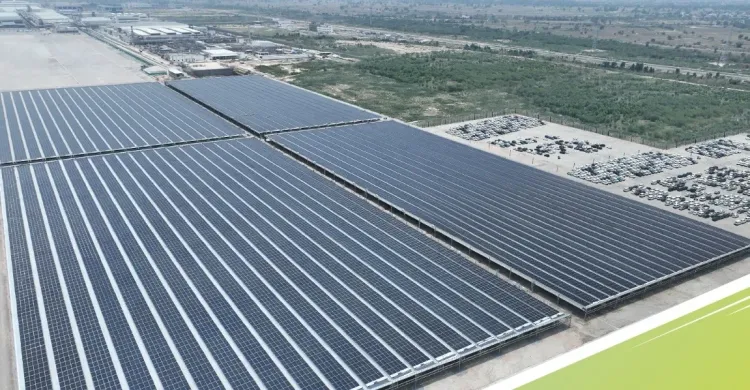Is Maruti Suzuki Expanding Solar Capacity in India with Over Rs 925 Crore Investment?

Synopsis
Key Takeaways
- Expansion of solar capacity by 30MWp across two projects.
- Total solar capacity now stands at 79MWp.
- Investment of over Rs 925 crore earmarked for future solar projects.
- Target of 319MWp by FY2030-31.
- Commitment to sustainability and green manufacturing practices.
New Delhi, June 4 (NationPress) Reaffirming its dedication to increasing the use of renewable energy in its operations, Maruti Suzuki India Limited announced on Wednesday the expansion of its solar capacity by 30MWp (megawatt-peak) through two new initiatives.
The company has initiated a 20MWp solar power project at its new facility in Kharkhoda, Haryana, while also enhancing its Manesar facility with an additional 10MWp solar capacity.
With these new developments, Maruti Suzuki's total solar capacity has surged from 49MWp to 79MWp in just one year.
The automaker aims to achieve a solar capacity of 319MWp by FY2030-31, supported by an investment exceeding Rs 925 crore.
The firm stated that it is increasing the percentage of green power sourced from state electricity boards for its operations. These solar and green power initiatives will significantly reduce its reliance on conventional energy sources.
“In alignment with our parent company, Suzuki Motor Corporation's Environment Vision 2050, and the Indian government's focus on renewable energy, we are systematically enhancing the use of sustainable energy in our operations,” stated Hisashi Takeuchi, Managing Director and CEO of Maruti Suzuki India Limited.
“As we aim to scale our production to four million units, we are equally committed to ambitious sustainable energy practices. This solar power expansion is a vital step towards fostering a cleaner and more sustainable energy ecosystem, positively impacting the environment,” he added.
Through continuous efforts, the share of renewable energy in total electricity consumption is projected to approach 85 percent by FY2030-31.
Maruti Suzuki India is actively moving towards green manufacturing across all its facilities.
In the four-wheelers segment for May, Maruti reported a 3 percent increase in volumes year-on-year, compensating for a 6 percent decline in domestic sales with an 80 percent surge in exports.










